英语特殊疑问句讲解及例句
全英讲解特殊疑问句

全英讲解特殊疑问句
特殊疑问句是用来询问特定信息的问句,以获得对某一事物或情况的详细了解。
下面是10个全英文讲解特殊疑问句的例子:
1. What is your favorite color?
你最喜欢的颜色是什么?
2. Where did you go on vacation?
你去哪里度假了?
3. How did you learn to play the piano?
你是如何学会弹钢琴的?
4. When is your birthday?
你的生日是在什么时候?
5. Why did you choose this university?
你为什么选择这所大学?
6. Who is your favorite author?
你最喜欢的作家是谁?
7. Whose book is this?
这本书是谁的?
8. Which restaurant do you recommend?
你推荐哪家餐厅?
9. How much does this shirt cost?
这件衬衫多少钱?
10. How many siblings do you have?
你有几个兄弟姐妹?
以上是10个全英讲解特殊疑问句的例子,这些问题可以用来获取不同方面的信息,涵盖了个人喜好、经历、时间、原因、所有权、推荐、价格和数量等方面。
通过使用特殊疑问句,我们可以更好地了解他人,扩展自己的知识和视野。
特殊疑问句的用法讲解(全)
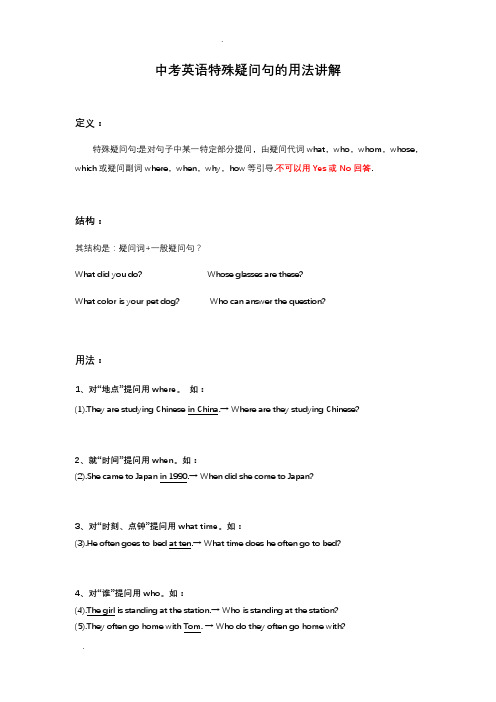
中考英语特殊疑问句的用法讲解定义:特殊疑问句:是对句子中某一特定部分提问,由疑问代词what,who,whom,whose,which或疑问副词where,when,why,how等引导.不可以用Yes或No回答.结构:其结构是:疑问词+一般疑问句?What did you do? Whose glasses are these?What color is your pet dog? Who can answer the question?用法:1、对“地点”提问用where。
如:(1).They are studying Chinese in China.→ Where are they studying Chinese?2、就“时间”提问用when。
如:(2).She came to Japan in 1990.→ When did she come to Japan?3、对“时刻、点钟”提问用what time。
如:(3).He often goes to bed at ten.→ What time does he often go to bed?4、对“谁”提问用who。
如:(4).The girl is standing at the station.→ Who is standing at the station?(5).They often go home with Tom. → Who do they often go home with?5、对“谁的”提问用whose。
如:(6).I will meet my father. → Whose father will you meet?6、对“年龄”提问用how old。
如:(7).The man over there is sixty. → How old is the man over there?7、对“哪一个”提问用which。
特殊疑问句例句大全

特殊疑问句例句大全特殊疑问句是用来询问特殊信息的疑问句,通常以特殊疑问词开头,如what, why, where, when, who, whom, whose, which, how等。
特殊疑问句通常用来询问对方的看法,了解事物的具体情况,或者求取特殊信息。
下面是一些特殊疑问句的例句大全。
1. What is your favorite color?你最喜欢的颜色是什么?2. Where did you go on vacation last year?你去年去哪里度假了?3. When is your birthday?你的生日是什么时候?4. Why did you choose this university?你为什么选择这所大学?5. Who is coming to the party tonight?今晚谁要来参加派对?6. Whose book is this?这本书是谁的?7. Which team do you think will win the game?你认为哪个队会赢得比赛?8. How did you learn to speak Chinese so fluently?你是怎么学会如此流利地说中文的?9. How much does this shirt cost?这件衬衫多少钱?10. How many people are going to the concert with you? 有多少人和你一起去听音乐会?11. What time does the movie start?电影什么时候开始?12. Where are we meeting for dinner?我们在哪里吃晚饭?13. When are you going to finish your project?你什么时候完成你的项目?14. Why are you leaving your job?你为什么要离开你的工作?15. Who is running for president in the next election?谁要参加下次选举竞选总统?16. Whose idea was it to go on this trip?这次旅行是谁的主意?17. Which restaurant did you go to for your anniversary dinner?你结婚纪念日晚餐是去哪家餐厅的?18. How did you learn to play the piano?你是怎么学会弹钢琴的?19. How much does it cost to rent a car for a week? 租一辆汽车一周多少钱?20. How many books did you read last month?你上个月读了多少本书?21. What do you want to be when you grow up?你长大了想做什么?22. Where is the nearest hospital?最近的医院在哪里?23. When is the best time to visit Japan?去日本的最佳时间是什么时候?24. Why did you decide to study abroad?你为什么决定出国留学?25. Who is your favorite singer?你最喜欢的歌手是谁?26. Whose turn is it to do the dishes?是谁洗碗的轮到了?27. Which team won the championship last year?去年谁赢得了冠军?28. How did you get to school this morning?你今天早上是怎么去学校的?29. How much time do you spend on social media every day? 你每天在社交媒体上花多少时间?30. How many languages do you speak fluently?你能流利地说几门语言?31. What kind of music do you like?你喜欢什么样的音乐?32. Where are you from?你来自哪里?33. When can we meet to discuss the project?我们什么时候能见面讨论项目?34. Why did you choose to live in the city?你为什么选择住在城市里?35. Who is your best friend?你最好的朋友是谁?36. Whose idea was it to go camping?去野营是谁的主意?37. Which country do you want to visit next?你想去哪个国家旅行?38. How did you learn to cook so well?你是怎么学会做饭的?39. How much money do you need to buy a new car? 买一辆新车需要多少钱?40. How many people are in your family?你家有多少人?41. What time does the store close?商店什么时候关门?42. Where is the nearest bus stop?最近的公交车站在哪里?43. When is the best time to go to the beach?去海滩的最佳时间是什么时候?44. Why are you studying for a degree in engineering? 你为什么要学工程学位?45. Who is in charge of the project?谁负责这个项目?46. Whose car is parked in front of the house?谁的车停在房子前面?47. Which movie did you see last weekend?你上个周末看了哪部电影?48. How did you get so good at playing chess?你是怎么变得这么擅长下国际象棋的?49. How much time do you spend exercising each week? 你每周锻炼多少时间?50. How many pets do you have?你有多少宠物?51. What do you want for your birthday?你生日想要什么?52. Where do you usually go on vacation?你通常去哪里度假?53. When is the best time to plant flowers?种花的最佳时间是什么时候?54. Why do you want to learn a new language?你为什么要学习一门新的语言?55. Who is your favorite author?你最喜欢的作家是谁?56. Whose idea was it to go on a road trip?去自驾游是谁的主意?57. Which restaurant serves the best pizza in town? 镇上哪家餐厅的披萨最好吃?58. How did you become interested in cooking?你是怎么开始对烹饪感兴趣的?59. How much does it cost to travel to Europe?去欧洲旅行要多少钱?60. How many hours of sleep do you get each night? 你每晚睡多少个小时?61. What time do you wake up in the morning?你早上几点起床?62. Where did you buy that dress?你在哪里买的那件连衣裙?63. When did you start learning to play the guitar?你什么时候开始学习弹吉他的?64. Why do you want to study abroad?你为什么想出国留学?65. Who is the best soccer player in the world?谁是世界上最好的足球运动员?66. Whose bike is parked in the garage?谁的自行车停在车库里?67. Which movie won the Oscar for Best Picture last year? 哪部电影去年获得了奥斯卡最佳影片?68. How did you learn to ride a bike?你是怎么学会骑自行车的?69. How much does it cost to rent an apartment in the city?在城市里租一间公寓要多少钱?70. How many hours a day do you spend studying?你每天学习多少小时?71. What do you want to do for a living?你想以什么为生?72. Where are you planning to go for your next vacation?你打算去哪里度假?73. When is the best time to visit the museum?参观博物馆的最佳时间是什么时候?74. Why did you decide to change careers?你为什么决定换个职业?75. Who is going to be the next president?谁将成为下一任总统?76. Whose idea was it to have a picnic in the park?在公园野餐是谁的主意?77. Which team will win the championship this year?哪个队会在今年赢得冠军?78. How did you learn to swim?你是怎么学会游泳的?79. How much does it cost to rent a house in the suburbs? 在郊区租一间房子要多少钱?80. How many movies have you seen this month?你这个月看了多少电影?81. What do you like to do in your free time?你空闲时间喜欢做什么?82. Where is the nearest post office?最近的邮局在哪里?83. When is the best time to visit the zoo?参观动物园的最佳时间是什么时候?84. Why did you choose to major in biology?你为什么选择主修生物学?85. Who is the most famous person you have ever met?你见过最有名的人是谁?86. Whose idea was it to have a surprise party?举办惊喜派对是谁的主意?87. Which team do you think will win the Super Bowl this year?你认为哪个队会在今年赢得超级碗?88. How did you learn to play the drums?你是怎么学会敲鼓的?89. How much time do you spend cooking every day?你每天花多少时间做饭?90. How many people are coming to the wedding?有多少人要来参加婚礼?91. What do you want to achieve in the next year?你想在明年实现什么?92. Where is the best place to go for a hike?最适合徒步旅行的地方在哪里?93. When is the best time to visit the Grand Canyon? 参观大峡谷的最佳时间是什么时候?94. Why did you choose to pursue a career in medicine? 你为什么选择从事医学职业?95. Who is the owner of the company?公司的所有者是谁?96. Whose idea was it to start a book club?成立读书俱乐部是谁的主意?97. Which team do you think will win the World Cup? 你认为哪个队会赢得世界杯?98. How did you learn to play the violin?你是怎么学会拉小提琴的?99. How much does it cost to rent a boat for the day? 一天租一艘船要多少钱?100. How many hours a week do you spend volunteering? 你每周参加志愿活动多少小时?101. What time does the concert start?音乐会什么时候开始?102. Where is the nearest gas station?最近的加油站在哪里?103. When is the best time to visit the Eiffel Tower? 参观埃菲尔铁塔的最佳时间是什么时候?104. Why did you decide to become a teacher?你为什么决定成为一名教师?105. Who is the best basketball player in the world? 世界上最好的篮球运动员是谁?106. Whose car broke down on the highway?谁的车在高速公路上抛锚了?107. Which team won the championship last season?上赛季谁赢得了冠军?108. How did you learn to speak French so well?你是怎么学会说法语如此流利的?109. How much time do you spend studying each day?你每天学习多少时间?110. How many people are invited to the party?有多少人受邀参加派对?111. What do you like to do on the weekends?你周末喜欢做什么?112. Where is the nearest grocery store?最近的杂货店在哪里?113. When is the best time to visit the Great Wall of China?参观中国长城的最佳时间是什么时候?114. Why did you decide to start your own business?你为什么决定开办自己的生意?115. Who is the most influential person in your life?你生活中最有影响力的人是谁?116. Whose idea was it to go on a skiing trip?去滑雪之旅是谁的主意?117. Which team do you think will win the Stanley Cup this year?你认为哪个队会在今年赢得斯坦利杯?118. How did you learn to play the saxophone?你是怎么学会吹萨克斯的?119. How much money do you spend on clothes each month?你每个月买衣服花多少钱?120. How many hours a day do you spend on the internet?你每天上网多少个小时?121. What time does the play start?戏剧什么时候开始?122. Where is the nearest train station?最近的火车站在哪里?123. When is the best time to visit the Louvre Museum? 参观卢浮宫博物馆的最佳时间是什么时候?124. Why did you choose to study psychology?你为什么选择学心理学?125. Who is the most important person in your life?你生活中最重要的人是谁?126. Whose idea was it to have a family reunion?举办家庭团聚是谁的主意?127. Which team do you think will win the World Series? 你认为哪个队会赢得世界大赛?128. How did you learn to skateboard?你是怎么学会滑板的?129. How much does it cost to rent a bike for the day? 一天租一辆自行车要多少钱?130. How many hours a day do you spend watching TV?你每天看电视多少小时?131. What do you want to do with your life?你想通过做什么来度过一生?132. Where is the nearest ATM?最近的ATM在哪里?133. When is the best time to visit the Taj Mahal?参观泰姬陵的最佳时间是什么时候?134. Why did you decide to become a police officer?你为什么决定成为一名警察?135. Who is the funniest person you know?你认识的人...。
英语特殊疑问句讲解及例句

英语特殊疑问句讲解一、基本概念通常以特殊疑问词开头,对句中某一成分提问的句子叫特殊疑问句。
常用的疑问词有:what 、who 、whose 、which、 when 、where 、how、 why等。
如果掌握规律,就变得简单多了。
总结一条就是:“特殊疑问词+一般疑问句”,但特殊疑问词的确定要根据提问内容确定,在小学阶段常出现的有以下几种:1.划线部分是“事或物”,特殊疑问词用what例: This is a bag. ---What is this?We often play football on Sundays . ---What do you often do on Sundays ?2、划线部分是“人”,特殊疑问词用who例:She is my sister. ---Who is she ?3、划线部分是“地点”,特殊疑问词用where例:The apple is on the desk.---Where is the apple ?4、划线部分是“时间”,特殊疑问词用what time或when例:It's six thirty . ---What time is it ?I usually get up at six forty . --- When do you usually get up?5、划线部分是“年龄”,特殊疑问词用how old例:I am twelve . ---How old are you?My mother is thirty- two . ---How old is your mother ?6、划线部分是“职业”,特殊疑问词用what例:Tom is a worker. ---What is Tom?/What does Tom do ?7、划线部分是“颜色”,特殊疑问词用what color例:My hat is blue . ---What color is your hat?8、划线部分是“数量”,特殊疑问词用how many或how much例:I can see five birds in the tree.---How many birds can you see ?There is some tea in the cup. ---How much tea is there in the cup ?9、划线部分是“多少钱”,特殊疑问词用how much例:This book is ten yuan . ---How much is this book ?10、划线部分是“形容词性物主代词或名词性物主代词”,特殊疑问词用whose 例:That is my shirt . ---Whose shirt is that ?二、小学英语对划线部分提问答题口诀:一代(用疑问词代替提问部分),二移(把疑问词移至句首),三找(找is , are ,can,would)抄在疑问词后,没有则用do,does(用于主语是第三人称),出现I am 则直接改为Are you),四抄(照抄其它部分)五改(出现some,要考虑是否改为any。
英语初中特殊疑问句详解
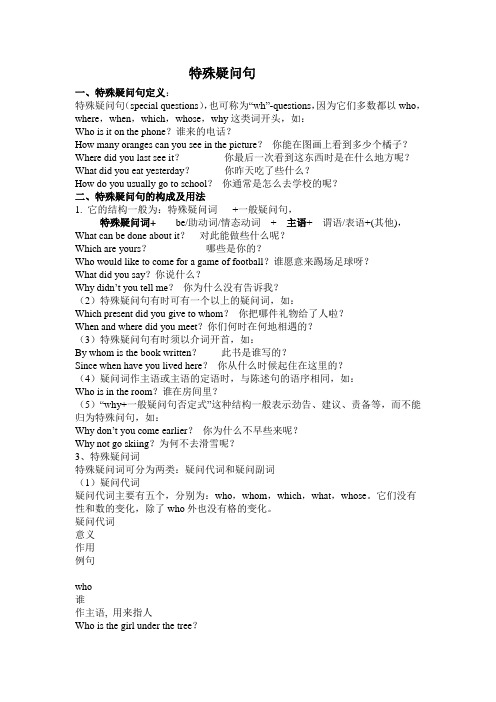
特殊疑问句一、特殊疑问句定义:特殊疑问句(special questions),也可称为“wh”-questions,因为它们多数都以who,where,when,which,whose,why这类词开头,如:Who is it on the phone?谁来的电话?How many oranges can you see in the picture?你能在图画上看到多少个橘子?Where did you last see it?你最后一次看到这东西时是在什么地方呢?What did you eat yesterday?你昨天吃了些什么?How do you usually go to school?你通常是怎么去学校的呢?二、特殊疑问句的构成及用法1. 它的结构一般为:特殊疑问词+一般疑问句,特殊疑问词+be/助动词/情态动词+ 主语+ 谓语/表语+(其他),What can be done about it?对此能做些什么呢?Which are yours?哪些是你的?Who would like to come for a game of football?谁愿意来踢场足球呀?What did you say?你说什么?Why didn’t you tell me?你为什么没有告诉我?(2)特殊疑问句有时可有一个以上的疑问词,如:Which present did you give to whom?你把哪件礼物给了人啦?When and where did you meet?你们何时在何地相遇的?(3)特殊疑问句有时须以介词开首,如:By whom is the book written?此书是谁写的?Since when have you lived here?你从什么时候起住在这里的?(4)疑问词作主语或主语的定语时,与陈述句的语序相同,如:Who is in the room?谁在房间里?(5)“why+一般疑问句否定式”这种结构一般表示劲告、建议、责备等,而不能归为特殊问句,如:Why don’t you come earlier?你为什么不早些来呢?Why not go skiing?为何不去滑雪呢?3、特殊疑问词特殊疑问词可分为两类:疑问代词和疑问副词(1)疑问代词疑问代词主要有五个,分别为:who,whom,which,what,whose。
干货合辑8个特殊疑问句的详细讲解!(附例句)
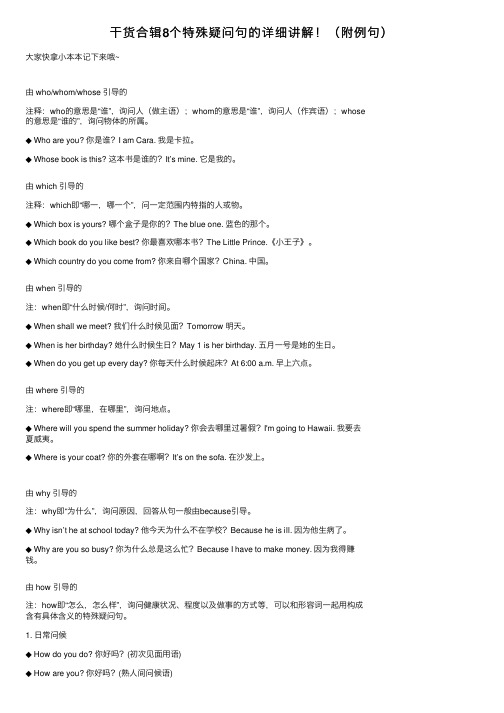
⼲货合辑8个特殊疑问句的详细讲解!(附例句)⼤家快拿⼩本本记下来哦~由 who/whom/whose 引导的注释:who的意思是“谁”,询问⼈(做主语);whom的意思是“谁”,询问⼈(作宾语);whose的意思是“谁的”,询问物体的所属。
◆ Who are you? 你是谁?I am Cara. 我是卡拉。
◆ Whose book is this? 这本书是谁的?It’s mine. 它是我的。
由 which 引导的注释:which即“哪⼀,哪⼀个”,问⼀定范围内特指的⼈或物。
◆ Which box is yours? 哪个盒⼦是你的?The blue one. 蓝⾊的那个。
◆ Which book do you like best? 你最喜欢哪本书?The Little Prince.《⼩王⼦》。
◆ Which country do you come from? 你来⾃哪个国家?China. 中国。
由 when 引导的注:when即“什么时候/何时”,询问时间。
◆ When shall we meet? 我们什么时候见⾯?Tomorrow 明天。
◆ When is her birthday? 她什么时候⽣⽇?May 1 is her birthday. 五⽉⼀号是她的⽣⽇。
◆ When do you get up every day? 你每天什么时候起床?At 6:00 a.m. 早上六点。
由 where 引导的注:where即“哪⾥,在哪⾥”,询问地点。
◆ Where will you spend the summer holiday? 你会去哪⾥过暑假?I'm going to Hawaii. 我要去夏威夷。
◆ Where is your coat? 你的外套在哪啊?It’s on the sofa. 在沙发上。
由 why 引导的注:why即“为什么”,询问原因,回答从句⼀般由because引导。
全英讲解特殊疑问句
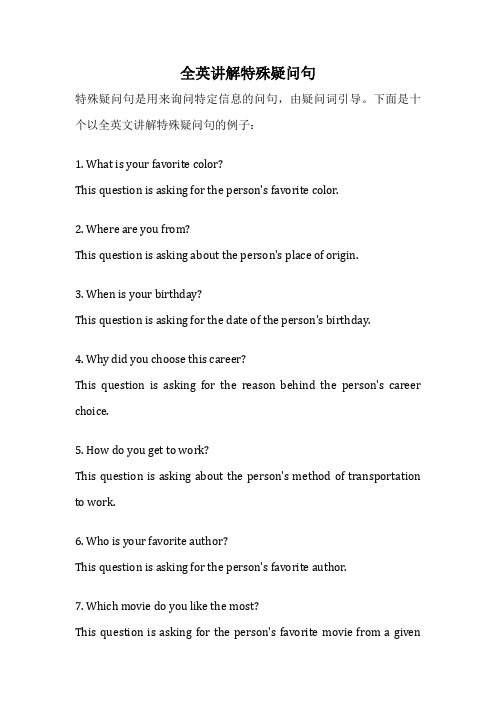
全英讲解特殊疑问句特殊疑问句是用来询问特定信息的问句,由疑问词引导。
下面是十个以全英文讲解特殊疑问句的例子:1. What is your favorite color?This question is asking for the person's favorite color.2. Where are you from?This question is asking about the person's place of origin.3. When is your birthday?This question is asking for the date of the person's birthday.4. Why did you choose this career?This question is asking for the reason behind the person's career choice.5. How do you get to work?This question is asking about the person's method of transportation to work.6. Who is your favorite author?This question is asking for the person's favorite author.7. Which movie do you like the most?This question is asking for the person's favorite movie from a givenselection.8. Whose car is parked outside?This question is asking about the ownership of the car parked outside.9. What time is it?This question is asking for the current time.10. How much does it cost?This question is asking for the price of something.These examples demonstrate how special interrogative sentences are used to inquire about specific information. The use of different question words such as what, where, when, why, how, who, which, and whose allows for a variety of questions to be asked.。
英语特殊疑问句句式结构

英语特殊疑问句句式结构特殊疑问句是用来询问特定信息的句子,通常以特殊疑问词开头,比如:what, where, when, how等。
以下是一些特殊疑问句的句式结构。
1. 询问事物的特征或属性:- What is the capital of France?- The capital of France is Paris.- 问:法国的首都是哪里?- 答:法国的首都是巴黎。
2. 询问事物的位置:- Where is the nearest hospital?- The nearest hospital is on Main Street.- 问:最近的医院在哪里?- 答:最近的医院在主街上。
3. 询问事物的时间:- When is the party?- The party is on Saturday at 8pm.- 问:聚会是什么时候?- 答:聚会是在星期六晚上8点。
4. 询问事物的原因:- Why are you late?- I'm late because of the traffic.- 问:你为什么迟到了?- 答:我迟到是因为交通堵塞。
5. 询问事物的方式或方法:- How do you make a cake?- You make a cake by mixing flour, eggs, and sugar. - 问:你怎么做蛋糕?- 答:你可以通过混合面粉、鸡蛋和糖来做蛋糕。
6. 询问事物的数量或程度:- How much does this shirt cost?- This shirt costs $20.- 问:这件衬衫多少钱?- 答:这件衬衫20美元。
7. 询问事物的归属:- Whose book is this?- This book is mine.- 问:这是谁的书?- 答:这是我的书。
总结:特殊疑问句是用来询问特定信息的句子,通过特殊疑问词开头,可以询问事物的特征、位置、时间、原因、方式、数量和归属等。
特殊疑问句例句大全

特殊疑问句例句大全特殊疑问句是一种用来询问特定信息或事实的问句,通常包括动词或特殊疑问词。
特殊疑问句可以用来询问事实、原因、方式、地点、时间、数量等。
下面是一些特殊疑问句的例句大全,帮助你更好地理解特殊疑问句的用法和结构。
1.询问事实:- What is your name?你叫什么名字?- How old are you?你多大了?- What is the capital of France?法国的首都是什么?- When is your birthday?你的生日是什么时候?2.询问原因:- Why are you crying?你为什么哭了?- Why did you stay home yesterday?你昨天为什么待在家里不出去?- What is the reason for your absence?你缺席的原因是什么?3.询问方式:- How do you learn English?你是怎么学英语的?- How can I get to the train station?我怎么去火车站?- In what way can I help you?我如何帮助你?4.询问地点:- Where is the nearest grocery store?最近的杂货店在哪里?- Where are you going?你要去哪里?- What place do you most want to visit?你最想去哪个地方?5.询问时间:- When does the movie start?电影什么时候开始?- What time does your class finish?你的课什么时间结束?- When will you arrive?你什么时候到?6.询问数量:- How many brothers and sisters do you have?你有几个兄弟姐妹?- What is the population of the city?这个城市的人口有多少?- How much does the book cost?这本书多少钱?7.综合例句:- What is the best way to learn a new language?学习一门新语言的最好方法是什么?- Where can I find the nearest bus stop?我在哪里能找到最近的公交车站?- Why didn't you tell me about the party?你为什么不告诉我有派对?- How long will it take to get to the airport?去机场要多久?- How many people are coming to the wedding?婚礼会有多少人来参加?- When is the best time to visit the Great Wall of China?参观中国长城的最佳时间是什么时候?以上是一些特殊疑问句的例句大全,希望对你有所帮助。
特殊疑问句的用法归纳
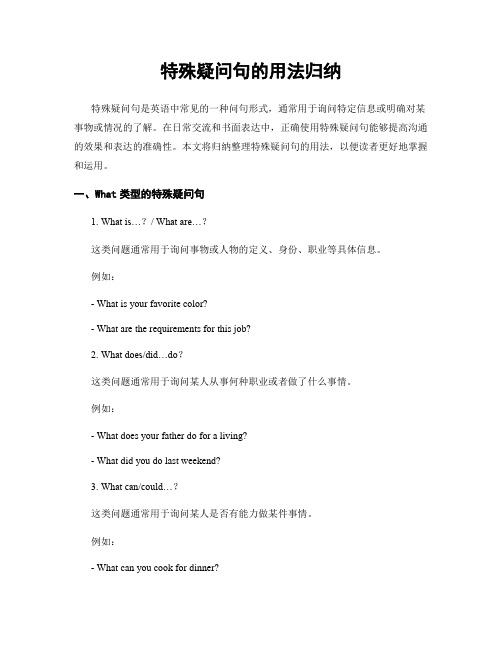
特殊疑问句的用法归纳特殊疑问句是英语中常见的一种问句形式,通常用于询问特定信息或明确对某事物或情况的了解。
在日常交流和书面表达中,正确使用特殊疑问句能够提高沟通的效果和表达的准确性。
本文将归纳整理特殊疑问句的用法,以便读者更好地掌握和运用。
一、What类型的特殊疑问句1. What is…?/ What are…?这类问题通常用于询问事物或人物的定义、身份、职业等具体信息。
例如:- What is your favorite color?- What are the requirements for this job?2. What does/did…do?这类问题通常用于询问某人从事何种职业或者做了什么事情。
例如:- What does your father do for a living?- What did you do last weekend?3. What can/could…?这类问题通常用于询问某人是否有能力做某件事情。
例如:- What can you cook for dinner?- What could you do to solve this problem?4. What has/have/had … done?这类问题通常用于询问某人(或某事物)已经完成了哪些具体行动。
例如:- What have you done to prepare for the exam?- What had he done before he got that promotion?5. What time…?这类问题通常用于询问具体事件或活动发生的时间。
例如:- What time does the concert start?- What time did they leave the party?二、Where类型的特殊疑问句1. Where is/was…?这类问题通常用于询问某人或某事物所在的地点。
特殊疑问句what的用法总结
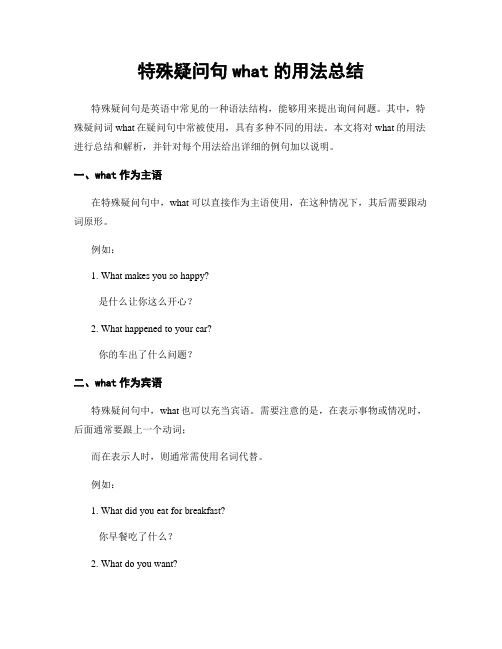
特殊疑问句what的用法总结特殊疑问句是英语中常见的一种语法结构,能够用来提出询问问题。
其中,特殊疑问词what在疑问句中常被使用,具有多种不同的用法。
本文将对what的用法进行总结和解析,并针对每个用法给出详细的例句加以说明。
一、what作为主语在特殊疑问句中,what可以直接作为主语使用,在这种情况下,其后需要跟动词原形。
例如:1. What makes you so happy?是什么让你这么开心?2. What happened to your car?你的车出了什么问题?二、what作为宾语特殊疑问句中,what也可以充当宾语。
需要注意的是,在表示事物或情况时,后面通常要跟上一个动词;而在表示人时,则通常需使用名词代替。
例如:1. What did you eat for breakfast?你早餐吃了什么?2. What do you want?你想要什么?三、what + 动词 + 状语在特殊疑问句中,我们还可以使用"what + 动词 + 状语" 的结构来询问关于具体行为或动作的状况。
例如:1. What did you do yesterday?昨天你做了什么?2. What will you do next week?下周你打算做什么?四、what + be动词 + 名词/形容词特殊疑问句中,what也可以用来询问事物的属性或者状态。
这时候我们需要用"be" 动词连接名词或形容词,从而得到相应的回答。
例如:1. What is your favorite color?你最喜欢的颜色是什么?2. What was the weather like yesterday?昨天的天气怎样?五、what + be动词 + 主语在特殊疑问句中,what与be动词连用,作为主语进行提问。
例如:1. What is bothering you?有什么困扰着你吗?2. What is happening over there?那边发生了什么事情?六、what引导的介词短语在特殊疑问句中,what有时还会引导一个介词短语,并询问关于地点、原因等方面的问题。
小学英语必须掌握的8个特殊疑问句,详细讲解(附例句)

小学英语必须掌握的8个特殊疑问句,详细讲解(附例句)
今天跟大家分享的是8个疑问词引导的特殊疑问句,赶紧拿出你的小本本开始学习吧~
由 who/whom/whose 引导的
注释:who的意思是“谁”,询问人(做主语);whom的意思是“谁”,询问人(作宾语);whose的意思是“谁的”,询问物体的所属。
◆ Who are you? 你是谁?I am Cara. 我是卡拉。
◆ Whose book is this? 这本书是谁的?It’s mine. 它是我的。
由 which 引导的
注释:which即“哪一,哪一个”,问一定范围内特指的人或物。
◆ Which box is yours? 哪个盒子是你的?The blue one. 蓝色的那个。
◆ Which book do you like best? 你最喜欢哪本书?The Little Prince.《小王子》。
◆ Which country do you come from? 你来自哪个国家?China. 中国。
特殊疑问句的三种结构及例句

特殊疑问句的三种结构及例句
特殊疑问句,也叫情态疑问句,是使用“could,would,shall,should,may,might,must,can,do,would,have,had”等情态动词的疑问句。
特殊疑问句可以更好地传达抽象的意思,如道德或情感上的意思。
本文将介绍特殊疑问句的三种结构及例句:
一. 用“would you”或“could you”开头:
这种结构是一种比较礼貌的发问方式,表达的是请求、允许、建议或提议的含义。
如:
1. Would you like to go to the cinema with me this evening?
2. Could you lend me some money?
二. 用“shall I”或“should I”开头:
这种结构表示提出建议、提议、询问对方的意见或征求对方的建议。
如:
1. Shall I pick you up after work?
2. Should I buy one or two tickets?
三. 用“do”开头:
这种结构表达的是询问事实或情况的真实性,像是询问一个发生了但未确认的事情,或者询问一个人是否理解某件事情,有不明白的时候可以使用这种句式。
如:
1. Do you understand what I just said?
2. Did he really go to England?
总之,特殊疑问句的三种结构及例句如上所述,可以提供有效的交流沟通,当使用语言发问时,一定要使用规范的语句,以免引起不必要的歧义或困惑。
人教部编版小学英语必考的8种特殊疑问句详解(附例句)

人教部编版小学英语必考的8种特殊疑问句详解(附例句)◆Who are you? 你是谁?I am Cara. 我是卡拉。
◆Whose book is this? 这本书是谁的?It’s mine. 它是我的。
由which 引导的注释:which即“哪一,哪一个”,问一定范围内特指的人或物。
◆Which box is yours? 哪个盒子是你的?The blue one. 蓝色的那个。
◆Which book do you like best? 你最喜欢哪本书?The Little Prince.《小王子》。
◆Which country do you come from? 你来自哪个国家?China. 中国。
由when 引导的注:when即“什么时候/何时”,询问时间。
◆When shall we meet? 我们什么时候见面?Tomorrow 明天。
◆When is her birthday? 她什么时候生日?May 1 is her birthday. 五月一号是她的生日。
◆When do you get up every day? 你每天什么时候起床?At 6:00 a.m. 早上六点。
由where 引导的注:where即“哪里,在哪里”,询问地点。
◆Where will you spend the summer holiday? 你会去哪里过暑假?I'm going to Hawaii. 我要去夏威夷。
◆Where is your coat? 你的外套在哪啊?It’s on the sofa. 在沙发上。
由why 引导的注:why即“为什么”,询问原因,回答从句一般由because 引导。
◆Why isn’t he at school today? 他今天为什么不在学校?Because he is ill. 因为他生病了。
◆Why are you so busy? 你为什么总是这么忙?Because I have to make money. 因为我得赚钱。
特殊疑问句例句大全

特殊疑问句例句大全特殊疑问句是用来询问特定信息的疑问句,包括了疑问代词(who, what, where, when, why, how等)或疑问副词(how, when, where, why等)。
下面是一些关于特殊疑问句的例句及解析。
1. What is your name?你叫什么名字?这是一个询问对方姓名的特殊疑问句,使用了疑问代词“what”。
在这个句子中,我们想知道对方的名字是什么。
2. Where are you going?你要去哪里?这是一个询问对方目的地的特殊疑问句,使用了疑问副词“where”。
在这个句子中,我们想知道对方要去的地方是哪里。
3. When is the meeting?会议是什么时候?这是一个询问时间的特殊疑问句,使用了疑问代词“when”。
在这个句子中,我们想知道会议的时间是什么时候。
4. Why are you crying?你为什么哭了?这是一个询问原因的特殊疑问句,使用了疑问代词“why”。
在这个句子中,我们想知道对方为什么在哭。
5. Who is that girl?那个女孩是谁?这是一个询问身份的特殊疑问句,使用了疑问代词“who”。
在这个句子中,我们想知道那个女孩是谁。
6. How did you get here?你是怎么来这里的?这是一个询问方式或方法的特殊疑问句,使用了疑问副词“how”。
在这个句子中,我们想知道对方是通过什么方式来到这里的。
7. How much does it cost?这个多少钱?这是一个询问价格的特殊疑问句,使用了疑问代词“how much”。
在这个句子中,我们想知道某物的价格是多少。
8. Which movie do you want to see?你想看哪部电影?这是一个询问选择的特殊疑问句,使用了疑问代词“which”。
在这个句子中,我们想知道对方想要看哪部电影。
9. Whose book is this?这是谁的书?这是一个询问所有权的特殊疑问句,使用了疑问代词“whose”。
小学四年级英语下册《特殊疑问句》,超详细讲解附例句

注:when即“什么时候/何时”,询问时间。
◆When shall we meet? 我们什么时候见面?Tomorrow 明天。
◆When is her birthday? 她什么时候生日?
May 1 is her birthday. 五月一号是她的生日。
◆When do you get up every day? 你每天什么时候起?
At 6:00 a.m. 早上六点。
由where 引导的
注:where即“哪里,在哪里”,询问地点。
◆Where will you spend the summer holiday? 你会去哪里过暑假?
I'm going to Hawaii. 我要去夏威夷。
◆Where is your coat? 你的外套在哪啊?
It’s on the sofa. 在沙发上。
由why 引导的
注:why即“为什么”,询问原因,回答从句一般由because引导。
◆Why isn’t he at school today? 他今天为什么不在学校?
Because he is ill. 因为他生病了。
◆Why are you so busy? 你为什么总是这么忙?
Because I have to make money. 因为我得赚钱。
英语句型中特殊疑问句的用法和例句
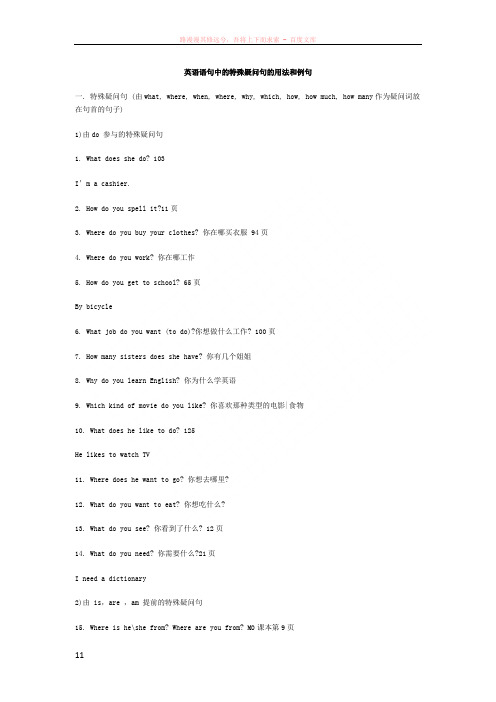
英语语句中的特殊疑问句的用法和例句一. 特殊疑问句 (由what, where, when, where, why, which, how, how much, how many作为疑问词放在句首的句子)1)由do 参与的特殊疑问句1. What does she do? 103I’m a cashier.2. How do you spell it?11页3. Where do you buy your clothes? 你在哪买衣服 94页4. Where do you work? 你在哪工作5. How do you get to school? 65页By bicycle6. What job do you want (to do)?你想做什么工作? 100页7. How many sisters does she have? 你有几个姐姐8. Why do you learn English? 你为什么学英语9. Which kind of movie do you like? 你喜欢那种类型的电影|食物10. What does he like to do? 125He likes to watch TV11. Where does he want to go? 你想去哪里?12. What do you want to eat? 你想吃什么?13. What do you see? 你看到了什么? 12页14. What do you need? 你需要什么?21页I need a dictionary2)由 is,are ,am 提前的特殊疑问句15. Where is he\she from? Where are you from? M0课本第9页He\she is from….I am from….16. What is your first name\phone number? M0课本11页It is…..17. When is your birthday? 13页It is in April18. Where is my book? 23页It is in the desk19. What day is it? 25页It is Wednesday20. Who is she? 35页She is Sam’s aunt.21. Where is he? 61页He is at the movie theater22. Where is the bank? 63页It is next to the supermarket.23. What time is the appointment? 73页It is at 1:30 on Friday24. How much is the\your tie? 87页It is 10$25. How much are your shoes? 89页They are 100$26. What color is her sweater? 91页It is blue27. What color are their shoes?They are brown.28. What room is this? 117This is a kitchen.29. What is his job? 101He is a mechanic.30. Which one is better? 那一个更好?This one 这个31. What are they doing?115They are getting the mail.What is he doing?He is making the lunch.3)其他 (对动作发出者,即语法中的“主语”的提问)32. Who lives in your house? (42页)33. What’s the matter?(47页)My hand hurtsI have a cold34. What huts? (49页)My eyes hurt35. Who does the housework at your house? 你家一般谁做家务120。
高中英语知识点归纳特殊疑问句的特殊用法

高中英语知识点归纳特殊疑问句的特殊用法特殊疑问句是用来询问特定信息的问句,一般以疑问词作为句首,如:what(什么),who(谁),when(何时),where(哪里),why(为什么)等。
在高中英语中,特殊疑问句有一些特殊的用法,本文将对这些用法进行归纳总结。
一、特殊疑问词用于主语在一般疑问句中,我们将助动词放在句首来构成疑问句,而在特殊疑问句中,特殊疑问词本身可以作为主语出现,即特殊疑问词+谓语动词+其他成分。
例句:1. Who broke the window?谁打破了窗户?2. What happened last night?昨晚发生了什么事?3. Why is she crying?她为什么在哭?二、特殊疑问词用于宾语特殊疑问词也可以用于宾语位置,即特殊疑问词+动词+其他成分。
例句:1. He asked me what I wanted for my birthday.他问我生日想要什么。
2. Could you tell me where the nearest post office is?你能告诉我最近的邮局在哪里吗?3. Do you know how the accident happened?你知道事故是怎么发生的吗?三、特殊疑问词引导的特殊句型1. 特殊疑问词+to do特殊疑问词可以引导不定式短语,表示为了做某事而做某事。
例句:1. What do you stay up late for?你熬夜做什么?2. Why did you come to the party early to help set up?你为什么早点来帮助布置聚会?2. 特殊疑问词+形容词/副词特殊疑问词可以引导一个形容词或副词,用于询问程度或描述对某事的态度。
例句:1. How tall is the tallest building in your city?你们城市最高的建筑物有多高?2. How fast can he run?他跑得有多快?3. 特殊疑问词+名词特殊疑问词可以引导一个名词,用于询问某人或某物的属性或特征。
特殊疑问句例句大全
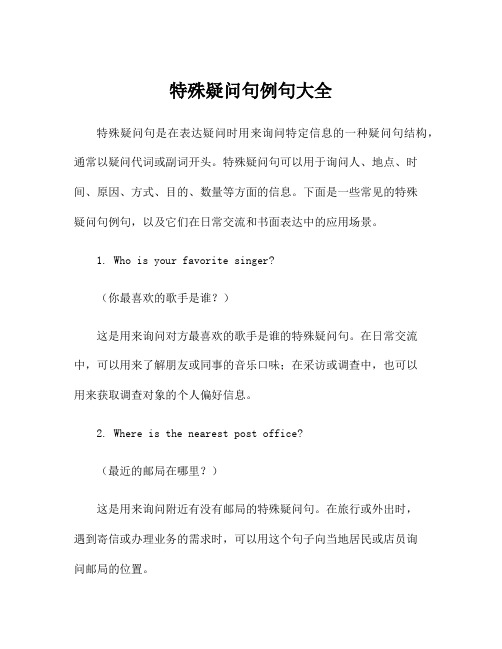
特殊疑问句例句大全特殊疑问句是在表达疑问时用来询问特定信息的一种疑问句结构,通常以疑问代词或副词开头。
特殊疑问句可以用于询问人、地点、时间、原因、方式、目的、数量等方面的信息。
下面是一些常见的特殊疑问句例句,以及它们在日常交流和书面表达中的应用场景。
1. Who is your favorite singer?(你最喜欢的歌手是谁?)这是用来询问对方最喜欢的歌手是谁的特殊疑问句。
在日常交流中,可以用来了解朋友或同事的音乐口味;在采访或调查中,也可以用来获取调查对象的个人偏好信息。
2. Where is the nearest post office?(最近的邮局在哪里?)这是用来询问附近有没有邮局的特殊疑问句。
在旅行或外出时,遇到寄信或办理业务的需求时,可以用这个句子向当地居民或店员询问邮局的位置。
3. When does the movie start?(电影什么时候开始?)这是用来询问电影放映时间的特殊疑问句。
在购买电影票或计划观影时间时,可以用这个句子询问电影院的工作人员或朋友了解电影的具体放映时间。
4. Why are you late?(你为什么迟到了?)这是用来询问对方迟到原因的特殊疑问句。
在工作或学习中,老师、上司或同事可能会用这个句子询问迟到的原因,以便了解情况并作出相应的处理或安排。
5. How do you get to the airport?(你怎么去机场?)这是用来询问到达机场的路线或交通方式的特殊疑问句。
在旅行或出差时,可以用这个句子向当地居民或指南问路,了解到达机场的最佳方式。
6. What is your purpose of visiting China?(你访问中国的目的是什么?)这是用来询问对方来中国旅行的目的的特殊疑问句。
在接待外国客人或进行对话交流时,可以用这个句子了解对方来华的目的,以便进行更有针对性的安排和服务。
7. How many siblings do you have?(你有几个兄弟姐妹?)这是用来询问对方家庭成员情况的特殊疑问句。
- 1、下载文档前请自行甄别文档内容的完整性,平台不提供额外的编辑、内容补充、找答案等附加服务。
- 2、"仅部分预览"的文档,不可在线预览部分如存在完整性等问题,可反馈申请退款(可完整预览的文档不适用该条件!)。
- 3、如文档侵犯您的权益,请联系客服反馈,我们会尽快为您处理(人工客服工作时间:9:00-18:30)。
英语特殊疑问句讲解一、基本概念通常以特殊疑问词开头,对句中某一成分提问的句子叫特殊疑问句。
常用的疑问词有:what 、who 、whose 、which、when 、where 、how、why等。
如果掌握规律,就变得简单多了。
总结一条就是:“特殊疑问词+一般疑问句”,但特殊疑问词的确定要根据提问内容确定,在小学阶段常出现的有以下几种:1.划线部分是“事或物”,特殊疑问词用what例: This is a bag. ---What is thisWe often play football on Sundays . ---What do you often do on Sundays$2、划线部分是“人”,特殊疑问词用who例:She is my sister. ---Who is she3、划线部分是“地点”,特殊疑问词用where例:The apple is on the is the apple4、划线部分是“时间”,特殊疑问词用what time或when例:It's six thirty . ---What time is itI usually get up at six forty . --- When do you usually get up5、划线部分是“年龄”,特殊疑问词用how old例:I am twelve . ---How old are youMy mother is thirty- two . ---How old is your mother<6、划线部分是“职业”,特殊疑问词用what例:Tom is a worker. ---What is Tom/What does Tom do7、划线部分是“颜色”,特殊疑问词用what color例:My hat is blue . ---What color is your hat8、划线部分是“数量”,特殊疑问词用how many或how much例:I can see five birds in the many birds can you seeThere is some tea in the cup. ---How much tea is there in the cup9、划线部分是“多少钱”,特殊疑问词用how much例:This book is ten yuan . ---How much is this book10、划线部分是“形容词性物主代词或名词性物主代词”,特殊疑问词用whose(例:That is my shirt . ---Whose shirt is that二、小学英语对划线部分提问答题口诀:一代(用疑问词代替提问部分),二移(把疑问词移至句首),三找(找is , are ,can,would)抄在疑问词后,没有则用do,does(用于主语是第三人称),出现I am 则直接改为Are you),四抄(照抄其它部分)五改(出现some,要考虑是否改为any。
出现I 改为you, 出现we 改为you ,出现my 改为your,出现our改为your。
最后是加问号)三、特殊疑问句有两种语序:1、如疑问词作主语或主语的定语,即对主语或主语的定语提问,其语序是陈述句的语序:疑问词(+主语)+谓语动词+其他成分|例:who is singing in the room﹖whose bike is broken﹖2、如疑问词作其他成分,即对其他成分提问,其语序是:疑问词+一般疑问句语序例:what class are you in﹖四、特殊疑问句的回答:1、回答特殊疑问句时,不能用yes /no,即问什么答什么,尤其是简略回答。
例:Who is from Canada﹖Helen (is).2、特殊疑问句一般读降调(↓)。
例句·一、问天气A: What is the weather like today B: It is hot today.二、问时间1.问几点: A: What’s the time now 或What time is it now B: It is + 时间点.2.问星期: A: What day is it today B: It is + 星期.3.问日期: A: What is the date today B: It is + 日期.三、问年龄: A: How old + be动词+人B: 人+ be动词+ 年龄.例:How old is your mother She is 35 (years old)(year-old).四、问价格多少: A: How much + be动词+ 物/代词(it,they等)B: 物/代词(it,they等)+ be动词+ 价格.例:How much are the apples They are 15 yuan.}How much is it It is 15$.五、问数量多少: A: How many + 物+ be动词+ there + 地点B: There + be动词+ 数量(+物+地点).例:How many books are there in the library There are 1000.六、问是谁:A: Who + be动词+ 人或代词(she,he,they…)B: 人或代词(He,She,They…)+ be动词+ ……例:Who is the young lady She is my English teacher.七、问颜色:A: What color + be动词+ 物B: 物/代词(It , They ) + be动词+ 颜色.例:What color is your dress It is pink.八、问职业:A: What + 助动词+人或代词(she,he,they…)+ do|或:What +be动词+ 人或代词(she,he,they…)B: 人或代词(He,She,They…)+ be动词+ 职业.(特别提醒:如果回答是一个人,那么“职业”要回答“a …”,如果是两个人以上,直接用复数形式,如:She is a teacher. They are students.)例:What do you do I am a teacher. What is your father He is a doctor.九、问地点:A: Where + be动词+ 地方B: 地方/代词(It,They)+ be动词+ 方位.十、问怎样去某个地方:A: How can/助动词+ 人+ get/go to the …B: 人或代词(He,She,They…)can go there by…例:How can I get to the cinema You can get there by bus.How does John go to the cinema He can go there on foot.十一、问是什么:#A: What + be动词+ 代词(it,they…)B: 代词(it,they…)+ be动词+ ….例:What is it It is a book. What are they They are books.十二、问外貌、性格:A: What + be动词+人或代词(she,he,they…)+ likeB: 人或代词(He,She,They…)+ be动词+ 外貌、性格形容词. 或:人或代词(He,She,They…)+ look或looks+ 外貌、性格形容词.例:What is your mother She is pretty and young.十三、问为什么:A: Why …. B: Because….例:Why are you so happy Because I don’t go to school.Why do you like summer Because I can swim in the river.Why do you like apples Because they’re sweet and healthy.¥(特别提醒:最后接的名词是可数的要用复数形式,答句用“they are”)十四、问感觉A: How +助动词+人+feel或:How+ be动词+人或代词(she,he,they…)’s+ feelingB: 人或代词(He,She,They…)+be动词+感觉形容词.或:人+ feel/feels/felt+感觉形容词.例:How do you feel 或How is your feeling I am happy. 或I feel happy.十五、问“怎么了”A: What’s the matter with +人或代词(用宾格:her,him,them,me)B: 人或代词(He,She,They…)+be动词+症状.;例:What’s the matter with you I have a headache.What’s the matter with her She has a fever.十六、问“吃什么”或“上什么课”A: What +助动词+人+have +时间B: 人+have/has+…(+时间).例:What do you have on Mondays I have Chinese, math and English.What does Mike have for lunch He has rice and potatoes for lunch.十七、问选择或最喜欢问选择:Which one +助动词+人+like, A or B问最喜欢:A: What is your/his/her/our favorite+东西(food,fruit,season…)~或:Which +东西(food,fruit,season…)+助动词+人+like bestB: My/His/Her/Our favorite +东西+ be动词+…或:人或代词(He,She,They…)like/likes +….+best.十八、问好例: How are you I am fine.How do you do How do you do十九、问意见about 后多加动词现在分词,What about 后多跟名词例: How about going out for a walk:What about another cake2.表建议时,两者通用。
例: What /How about a drink3.表征求意见或打听消息,用What about例:What about the university4.有多种事物供选择时,只能用How about例:Here are three jackets .How about the gray one二十、问地名例: What place is it It is a school .二十一、问多长时间或某物有多长用How long1.·2.表示多长时间,主要用来对一段时间(如three days, four weeks 等)提问。
